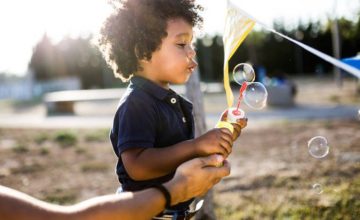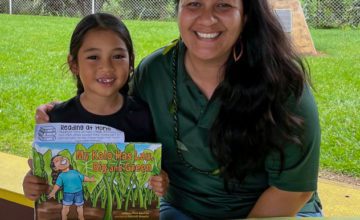Developing self-control begins at birth and continues across our lives. Young children learn self-control through interactions with peers and guidance from parents and other loving adults.
Babies are not born with self-control. However, babies begin developing self-soothing skills—the beginning of self-control—in their first months. For example, many babies learn how to soothe themselves by sucking on a pacifier or finger. This helps them cope with waiting while their mother gets ready to feed them.
Here is another example:
A 9-month-old grabs the television remote. He is happily pushing buttons when his mother gently removes it from his hand and puts it on a bookshelf. She says: “The remote control is not a toy, sweetie. But how about this instead?” She gives him a toy with buttons to push and doors to open. This baby is learning about self-control because he has to accept a substitute toy—although his mother made sure he could still explore with his hands.
Rules don’t work with babies. They don’t understand and can’t remember rules, and they can’t stop themselves from touching or exploring. So it’s up to grown-ups to make sure babies stay safe when they play.
What You Can Do To Help Babies Begin To Develop Self-Control
Help babies learn to soothe themselves. Babies have different ways of calming down. Some need lots of contact like rocking or hugging while others like being swaddled or put down for a minute. Some babies are soothed by your singing, while others suck to calm themselves. By trying different things to help babies calm down, you help babies learn to soothe themselves. You also teach the baby that she can rely on you, which makes her feel safe and secure.
Find ways to keep yourself calm. Hearing babies cry can be very stressful and frustrating. It can make you feel worried or even make you feel powerless—when you want to help a baby feel better but can’t figure out what to do. When you feel this way, it’s best to put the baby down somewhere safe (like a crib) and take a few moments to soothe yourself. The calmer you are, the calmer the baby will be.
Teach babies what they can do, not just what they can’t. If a 10-month-old is throwing a toy car in the house, gently take it from his hand and give him a soft ball instead. Over time, experiences like these help him learn right from wrong. But, remember, at 10 months, babies are not able to remember rules so he may still throw his toy car a little while from now!
Remember, you can’t spoil a baby. If a baby is crying, it’s often because she needs you to help her calm down because she is feeling overwhelmed. You can’t “spoil” a baby by holding her. Babies need your love and comfort. This helps them grow up to be secure and confident children.




